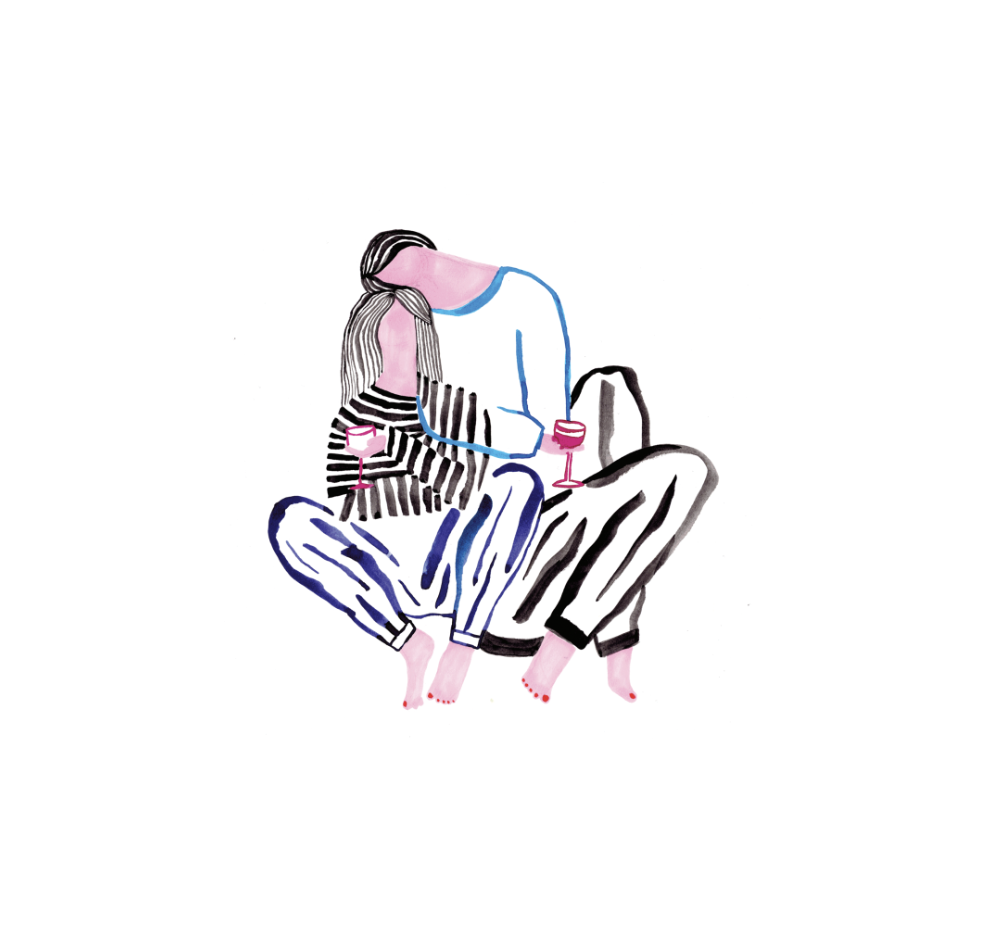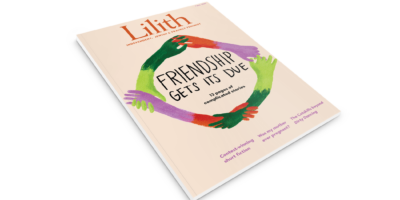
ART: HADAS HAYUN
The Rainbow “-Ship”
There is no word, no phraseology, no all-encompassing term that describes us or our much-connected hearts.
Joan Schuman
“Friendly Definitions,” Sinister Wisdom journal
“Queer Folks Are Always Hooking Up With Their Friends”
The LGBTQ+ community is brimming with clichés about friendship, romantic relationships, and the shades of intimacy in between. These jokes and broad strokes circle a truth embedded in queer relationships, which can push the boundaries between family, friendships, and romance.
This expansive thinking, while sometimes messy and confusing, is also liberating.
After I came out, I learned that rejecting one piece of the traditional relationship model (heterosexuality) can ignite a sense of empowerment to challenge other social expectations—such as the ideas that we should be in a relationship with only one person, that sex should exist solely in a romantic context, or that family is defined by blood and ranks highest in the hierarchy of intimacy.
“Queering” Friendship and “Friendshipping” Queer Dating
There is a gap here, the distance between lover and friend, and I want to fill that gap with a language that sustains me as richly as all my relationships sustain me.
Elizabeth Clare,
“Friends, Lovers and Passion,” Sinister Wisdom
After my last breakup, I could not imagine ever dating again. But after a few months, loneliness and a need for distraction drove me to “the apps.” I wasn’t ready for a new relationship, and I didn’t want a superficial hook-up—I wanted companionship that I didn’t have words to describe, and the culture of queer dating led me to what I needed. I met Jane on Tinder and we became friends with a physical relationship, which we eventually ended on good terms about a year later. Then there was Halle—after a few dates, we shifted into a comfortable friendship, while filling each other in on our subsequent dating experiences. “I met two great people on Hinge,” she told me. “You and my boyfriend.”
While straight folks experience similar configurations of intimacy all the time (the term “friends with benefits” come to mind), many face the socially imposed burden of what a straight relationship “should’’ be—monogamous, committed, with one ultimate trajectory. For some cis straight women, that means there is more shame to face down if they choose a path other than classic monogamy.
Queer folks are already in uncharted territory, already deviating from the norm, already fighting against shame. In response to an Instagram poll, nearly twice as many of my queer women and trans/gender nonconforming/nonbinary friends shared that they’d experienced a relationship neither distinctly platonic or romantic—compared to straight cis women. One friend described a relationship that “was romantic at first, then platonic, then romantic, then…I don’t know what.” Another said of a friend: “Our messages are love poems. I have candles I only light when she comes over…” And yet another friend shared, “I eventually had to call an older dyke to ask her, “IS THIS NORMAL,” after a year of a “very gray-area friendship.” “We slept in the same bed every night but nothing ever happened,” she described. (Eventually, it did).
What makes these experiences queer isn’t simply their porousness—it’s the recognition of that porousness.
Look closely (or just watch a single episode of The L Word) and you’ll notice that queer pop culture is overflowing with such stories. In an episode of my favorite queer comedy podcast—Two Dykes and a Mic—one of the hosts laughs, “I feel like I’ve had so many friendships where I’m like, ‘Are we married to each other? Are we in love?’”
Perhaps my favorite example is the song “Rebel Girl” by 90’s riot grrrl band Bikini Kill, which boldly captures the culture of inherently defiant, queer, feminist line-blurring from the very first verse. Lead singer Kathleen Hanna shouts, “That girl, she holds her head up so high, I think I wanna be her best friend, yeah.” Later, she adds, “In her hips, there’s revolution… In her kiss, I taste the revolution.” In an interview with Uncut, Hanna proclaimed, “It’s about being a feminist pirate, being an adventurer.” The song not only validates the ambiguity common in friendships between queer women—it amplifies the “revolutionary” power of anarchic love, with a candid nod to the inextricable angst and confusion that sometimes follow.
Chosen Family
In The Family Flamboyant (2006), queer theorist Marla Brettschneider describes marriage as an opportunity to “make a family based on choice.” But long before marriage equality legislation was passed in the U.S., queer folks were creating their own de facto families. Some of this is necessitated by a lack of acceptance by biological families, leading many queer people to build their own families out of friends.
But for others, the concept of the “chosen family” is again, both liberation from and resistance to traditional norms, which, queer sex educator Lena Peak and queer sex therapist Casey Tanner describe as based in “white Western relationship scripts and capitalist ideals, [since] Capitalism thrives on traditional marriage and nuclear family structures.”
Indeed, BIPOC (Black, Indigenous, and People of Color) communities in particular have extensive histories of chosen family practices—and as Sherronda Brown writes in a recent Prism article, “In the white imagination, the othering of Black and Indigenous identities, kinship, and collective communal structures became aligned with—and demonized alongside—queerness.” Chosen family challenges the dominant image of the mom and dad family unit and the preconceived stratification of who should matter to us and how much. An episode from the podcast How to Talk to People says, “Our culture encourages us to put friendship last on the priority list.” But the truth originating from the margins tells us we have a right to surround ourselves with and prioritize the people who “get” us.
And in a revolutionary victory, California passed a law this year legitimizing the value of chosen family by implementing family and sick leave for a “designated person” of an employee’s choosing, regardless of how or if they are legally related. Concrete, systemic recognition of nondominant cultural practices are few and far between, but optimism leads me to take this example as an indication of more to come.
…And make it Jewish
In an interview, queer sex educator and author Cory Silverberg (which you can read at Lilith.org), told me about being raised in a household where questioning authority and fantasizing about “the life I wanted” was encouraged. They shared that even before they became aware of their queerness, “I learned that I didn’t have to follow the rules—that it was my job to question rules.” Not only is this an empowering mindset for a young queer person (not to mention, another core tenet of queer theory)—it is also, Silverberg notes, “a very Jewish experience.”
From the time we’re old enough to recite the four questions during the Passover Seder, so many young Jews learn that being Jewish means asking questions. Part of this comes from the teachings in our foundational texts—the rabbis in the Torah and Talmud are constantly raising questions, often without landing on singular answers.
In the center of the queer-Jewish venn diagram is the notion of the dynamic and the indefinite: When it comes to identity, the queer community holds space for the ever-evolving person—who we are and how we present and who we love can change over time, and we do not have to be entirely one way or another. And in our relationships, there is room for ambiguity, where friendship can be romantic and romance can be friendship and everything in between is legitimate too.
Chosen families and friendship-with-benefits and other, perhaps undefined, shades of intimacy are ever-growing branches of a queer old tree rooted in a tumultuous and glitter-adorned history. After centuries of being denied rights and jailed and murdered and hated on the basis of our relationships with each other, our people are still building community and falling in love, with fierce and revolutionary resolve. Everyone could use a little less “supposed to” and a little more connection. The rulebook is empty and we all get a pen.
(Some names have been changed to protect the privacy of the people mentioned in this piece.)


